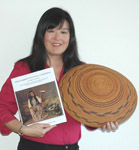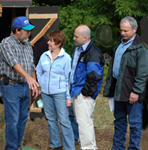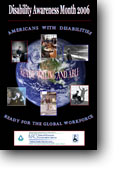|
| |
 
The Natural Resources Conservation Service —
Helping People Help the Land.
Subscribe to NRCS This Week
| NRCS This Week Articles Index | NRCS
This Week Archives |
Contact Us |
Where to Get Information
|
eNotes from
NACD |
 TSP Express
(Requires Adobe Acrobat.) TSP Express
(Requires Adobe Acrobat.)

California
 Conserving
Natural Resources — Preserving Antiquities Conserving
Natural Resources — Preserving Antiquities
Conserving natural resources and helping preserve ethnological American Indian
antiquities of Central California keeps Petaluma area resource conservationist
Lisa Woo Shanks on the go. Lately she has been busy researching, photographing,
and editing the recently published, Indian Baskets of Central California
authored by her husband Ralph Shanks, Vice President of the Miwok Archeological
Preserve of Marin County.
Florida
 NRCS Continues Hurricane Clean-up Efforts NRCS Continues Hurricane Clean-up Efforts
This
item requires
Windows Media Player
 Listen
to how
NRCS in Florida is helping clean-up after 2004 and 2005 hurricanes. Listen
to how
NRCS in Florida is helping clean-up after 2004 and 2005 hurricanes.
Oregon
 Chief
and Associate Chief Visit Oregon Chief
and Associate Chief Visit Oregon
Chief Arlen Lancaster and Associate Chief Dana York recently visited the Yamhill
Soil and Water Conservation District’s (SWCD) new Miller Woods learning center.
The learning center is located on a 130-acre working farm that was deeded over
to the Yamhill SWCD by owner by the Woods family to prevent their homestead from
being developed. The learning center is also the site of Oregon’s newest
snow telemetry (SNOTEL) site.
Connect to
NRCS' State
News,
Newsroom, and
News Releases!

 October is National Disability Employment Awareness Month October is National Disability Employment Awareness Month
To recognize the contributions of Americans with
disabilities and to encourage all citizens to ensure equal opportunity in the
workforce, the Congress, by joint resolution approved as amended (36 U.S.C.
121), has designated October of each year as "National Disability Employment
Awareness Month."
Links…
See the President's
National Disability Employment Awareness Month
2006 Proclamation

 Bees:
Helping Farmers with their Crops
—
NRCS: Helping Farmers with their Bees Bees:
Helping Farmers with their Crops
—
NRCS: Helping Farmers with their Bees
Pollinators are an important part of on-farm biodiversity. They help maintain
diverse plant communities that provide food for wildlife and provide pollination
for approximately 70 percent of crops worldwide. Farmers in the U.S. rely upon
insect pollinators to produce a wide variety of fruits and vegetables, including
apples, almonds, berries, cherries, cucumber, melons, squash, and sunflowers.

Northeast and Southern SARE now Requesting Proposals
for Sustainable Community Grants
Northeast SARE and Southern SARE are requesting proposals for their Sustainable
Community Grant Programs. Community nonprofits, Cooperative Extension, local
governments, RC&Ds, educational institutions, planning boards, farming
cooperatives, and incorporated citizens’ groups are all eligible to apply.

Click here for
NRCS Directives for the week of October 8, 2006
The U.S. Department of Agriculture (USDA) prohibits discrimination in all its
programs and activities on the basis of race, color, national origin, age,
disability, and where applicable, sex, marital status, familial status, parental
status, religion, sexual orientation, genetic information, political beliefs,
reprisal, or because all or a part of an individual's income is derived from any
public assistance program. (Not all prohibited bases apply to all programs.)
Persons with disabilities who require alternative means for communication of
program information (Braille, large print, audiotape, etc.) should contact
USDA's TARGET Center at (202) 720-2600 (voice and TDD). To file a complaint of
discrimination write to USDA, Director, Office of Civil Rights, 1400
Independence Avenue, S.W., Washington, D.C. 20250-9410 or call (800) 795-3272
(voice) or (202) 720-6382 (TDD). USDA is an equal opportunity provider and
employer.
| | |


